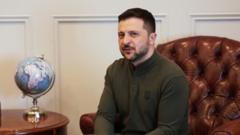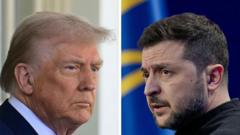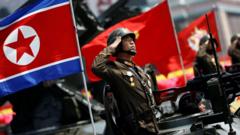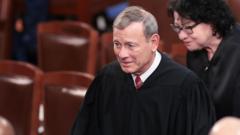In a notable meeting at the White House, President Trump and British Prime Minister Keir Starmer expressed radically different views on the Ukraine conflict and how to approach peace with Russia. Trump, exuding confidence in Russian President Vladimir Putin's reliability, asserted his belief that Putin would honor any peace agreement reached concerning Ukraine. “I think he’ll keep his word,” Trump stated, despite the ongoing violence and instability in the region.
President Trump and Prime Minister Starmer: Diverging Views on Ukraine Peace

President Trump and Prime Minister Starmer: Diverging Views on Ukraine Peace
Amid ongoing tensions, a high-profile meeting reveals stark differences in U.S. and U.K. foreign policies regarding Ukraine.
Starmer directly countered Trump’s optimistic stance during their Oval Office discussions. He advocated for British troops to participate in a postwar peacekeeping mission in Ukraine and urged Trump to provide support and assurances against potential Russian betrayal in the future. Trump’s response to questions about U.S. support for Britain’s effort was notably ambiguous, oscillating between affirmation and denial, ultimately suggesting, “They don’t need help.”
In addition to discussions on Ukraine, Trump announced upcoming tariffs targeting goods from Canada and Mexico, claiming their governments had not done enough to combat drug trafficking into the U.S. He also indicated a potential 10 percent tariff on Chinese imports set to begin soon, sparking concerns among economists about the implications for economic stability and potential trade wars.
As the geopolitical landscape continues to shift, the meeting highlighted the contrasting strategies on international conflict resolution adopted by the two leaders, setting the stage for potential future confrontations over issues of global security and cooperation.
This encounter underscores not only the divergent philosophies of the Trump administration and the Starmer government but also the broader implications of U.S.-UK relations as they navigate the complexities of evolving global challenges.
In addition to discussions on Ukraine, Trump announced upcoming tariffs targeting goods from Canada and Mexico, claiming their governments had not done enough to combat drug trafficking into the U.S. He also indicated a potential 10 percent tariff on Chinese imports set to begin soon, sparking concerns among economists about the implications for economic stability and potential trade wars.
As the geopolitical landscape continues to shift, the meeting highlighted the contrasting strategies on international conflict resolution adopted by the two leaders, setting the stage for potential future confrontations over issues of global security and cooperation.
This encounter underscores not only the divergent philosophies of the Trump administration and the Starmer government but also the broader implications of U.S.-UK relations as they navigate the complexities of evolving global challenges.





















